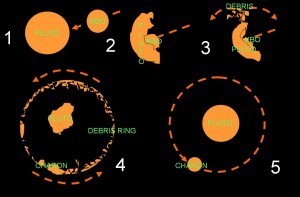Worldbuilding: the big picture

This is how the moons of Pluto were birthed. Have you planned how your world was born?
(Picture by Acom, via Wikipedia)
Lately, I’ve been doing a series of worldbuilding sessions with my writing group. Building a fictional world is a big job and huge amounts of fun. I thought I’d start sharing my notes and approach here, too.
Now, I’m not going to tell you what world you should build, or how your world should work. Your world is your own. What I’m going to do is present some questions, some common wisdoms, and some things for you to think about. What choices you make, how you choose to apply certain techniques or facets of worldbuilding, are completely up to you.
There are so many things to think about when building a world that it’s not possible to do it any kind of justice in a single blog post or writing group meeting. So I’m going to break it down into focussed areas, such as:
Creating a magic system
Building a space station
Creating a colony
Many of these areas will bleed into each other; they can’t be considered in isolation. Influences will flow back and forth between them and that’s up to you to balance. These are starting points, thinking points, and hopefully something you can have a bit of fun with.
Before we get started, it’s probably a good idea to go over my high-level philosophy when it comes to world-building.
Your world needs to make sense.
It doesn’t matter what genre or type of world you’re building, whether it’s fantastical, far future, alien, historical, or an alternate dimension where gravity is a repelling force instead of an attracting one. Internal logic and consistency are key if readers are going to buy into it and travel through it with you.
It’s not just window dressing.
Worldbuilding is more than scenery or description. It’s a lot more than just a map; geography is part of it, but you have so many more tools to use than that. It’s all those things that make it different from the world we experience every day. It’s a place in history (even if that history is our future). It’s laws and rules, it’s society and people, it’s belief and purpose. Go nuts!
Elements in your world can conflict with each other, as long as the logic remains true.
You can mix magic and science, you can have the laws of physics and break them. In fact, you can get a lot of story elements out of these things! Harmony is nice but it’s not required (and sometimes it’s downright boring!). It’s okay if things clash or contradict, as long as it makes sense that they would exist in the same world. Just be aware that you might need to explain why the contradiction isn’t impossible.
Don’t get lost in your worldbuilding.
It’s so easy: worlds are fascinating places, and we pour so much creative energy into building them that it can suck up all of our time and inspiration before we realise what has happened. I know writers who spend so much time building their worlds that they never get to the actual story the world is for. If building the world is what you’re really interested in, that’s fine! But if you want to write a story, be careful of tumbling all the way down the rabbit-hole without your characters along for the ride.
You don’t have to build the whole world before you start your story.
Just like any kind of research, you don’t need to know everything before you start: you just need enough. How much is enough? That depends on a lot of things, such as how different your world is from our reality, and how crucial the elements are to how your story will go. You need to be confident that you know the world well enough to write in it without stumbling.
It’s also okay to pause in your writing to work out more things about the world. You’re going to end up in places in your story that you probably didn’t expect, and you’ll need to fill in gaps as you go. Keep your world consistent (build it out, rather than rebuilding it at will), and you’ll be fine. No-one will notice! If you’re not writing a live serial like I am, you have the freedom to go back and rework things if you do have to rebuild something. Make sure you keep your story straight!
Keep an eye out for story elements.
I can’t recommend this enough. Worldbuilding is such a great source of things a story can play with: character facets; plot elements; conflict; obstacles; motivation… the list is endless. If you’re feeling that a story idea is too thin, it’s worth having a go at some worldbuilding around it; you might be surprised by some of the things that rise up and deepen your idea into something fat and juicy.
Have fun with it!
If worldbuilding is a chore, you’re not doing it right. If you’re bored, then maybe your readers will be, too. Build a world that excites you, build a world you can’t wait to delve into. It might be a place you’d never want to walk yourself, but it can still be a great setting for a story.
Hopefully, that gives you an idea of what I go for with my worldbuilding (and worldbuilding advice). More posts on this coming up. Keep an eye on the worldbuilding tag!




